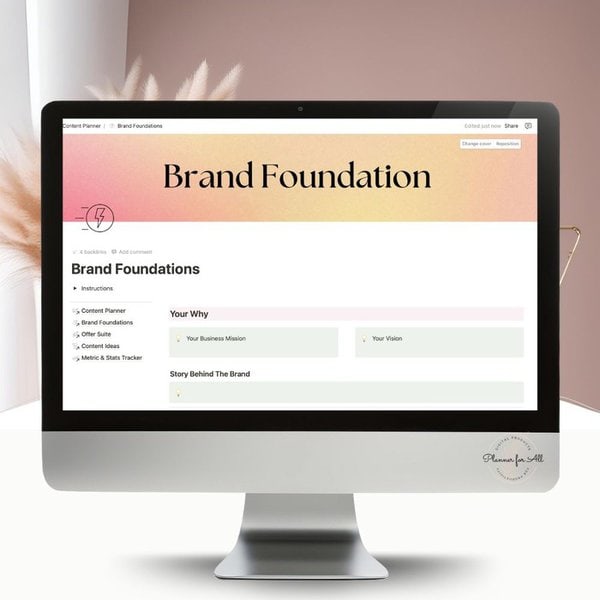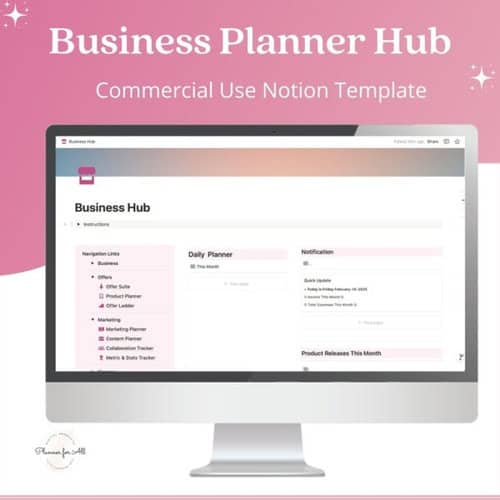Running an online business requires wearing multiple hats, which can easily become overwhelming. Set up a Notion business hub to get organized and save time!
Starting a new business is like embarking on an exciting journey where every decision shapes your path. One of the first steps in this adventure is organizing your operations as it will help you to streamline your operations, save time, and get more done in lesser time. And Notion is the best tool to do this.
Consider Notion as your digital workspace – you can use it to streamline tasks, manage projects, and keep everything you need right at your fingertips. In this guide, we’ll walk through setting up a business hub in Notion, so that you can focus on what truly matters: growing your business.

Why Choose Notion?
But why Notion makes for a good business organization tool? Because Notion has everything you need to set up your organization hub on a budget. It has
- Flexibility: Customize it to suit any need, from simple task lists to complex project management systems.
- All-in-One Platform: Consolidate notes, databases, calendars, and more into one cohesive system.
- Collaboration: Easily share and collaborate with team members or partners.
- Ease of Use: Its intuitive design makes it accessible even if you’re not tech-savvy.
Now lets see how you can set up your business hub in Notion.
Setting Up Your Business Notion Hub
Think of your Notion workspace as the command center for your business operations. Here’s how to get started:

Set up Notion
- Visit Notion’s website and sign up using your email or Google account.
- Once registered, you’ll be greeted with a blank canvas—your new workspace.
Organize Your Dashboard
You can create a dashboard from scratch or you can use The Business Planner Notion template to quickly set up your business hub.
What should be in your Business Planner Template
Main Dashboard
The first section you see when you duplicate the dashboard is your homepage. This is the central point for your business. You have links to all the important pages such as content planner, finances, contacts, brand foundations etc here.
This is the page you will refer again and again so make sure you have important notifications set up.
- Homepage: this acts as a central navigation point. It contains links to key pages such as Projects, Calendar, Finances, and Contacts.
- Quick Reminders: Reminder about upcoming deadline or commitments are displayed on the home page for you to take easy action.
Business Section
This is where all the details about your business will be stored.
- Business Foundation – record your business details here. This includes your business mission, vision, core problems your business solves, topics, and marketing assets.
- Important Links – keep a record of your important links (website, social media, scheduling ) here. Refer them back to save yourself time from searching them
Now that you have a basic structure in place, it’s time to build out the core components of your hub:
Task Management
Use Notion’s database feature to create a task management system:
- To-Do List: A simple or comprehensive checklist for daily tasks. You can categorize them by priority or deadline.
- Project Tracker: For larger initiatives, use the project tracker with proper statuses like In Progress, Completed, and Pending Review. This will help you to break down larger projects into smaller tasks and track them to completion.
Calendar Integration
With Notion, you can easily publish Notion tasks into your Google Calendar. This will help you to get reminders and notified about upcoming deadlines.
You can color-code events based on event types to help you easily identify the event and save time.
Finance Tracker
No business planner is complete without an effective finance tracker. Your finance tracker should enable you to track your income, expenses, recurring expenses, and also lets you run analysis to find the best revenue months.
Offer Suite
Keep a record of the services and products you will be offering in your business. You have enough flexibility to expand your offerings while solving the core problems for your customers.
Content Planner
Any content that you create for your business should have a specific purpose. Use the content planner to plan out your content and tracking your best performing content, time, and topics.
- Use content planner to map out your content
- Track performance of your content across different platforms and identify the best platform for your business
Have a dedicated page for communication logs so that you don’t miss any important updates or commitments.
- Record meeting notes here so everyone stays informed about decisions made during discussions.
- Use collaboration tracker to plan your collaboration and networking efforts. This is useful to market your business and collaborate with other experts in your industry
Optimizing Workflow Processes
Efficiency is the backbone of any successful enterprise. Here are ways to optimize workflows in Notion:
Templates for Repeated Tasks
Save time by creating templates for recurring tasks such as weekly reports or client onboarding processes:
- Design templates once and duplicate them whenever needed without starting from scratch each time.
- Use databases to connect different sections so you don’t have to enter it repeatedly
Want a shortcut
As you can see, setting up a business hub helps you to create a streamlined process to get things done – from launching products efficiently through maintaining organized records down future scaling efforts.
Remember—the goal isn’t just getting things done but doing so smartly while enjoying process along way too! So go ahead dive right start building foundation supports dreams aspirations become reality tomorrow today!
